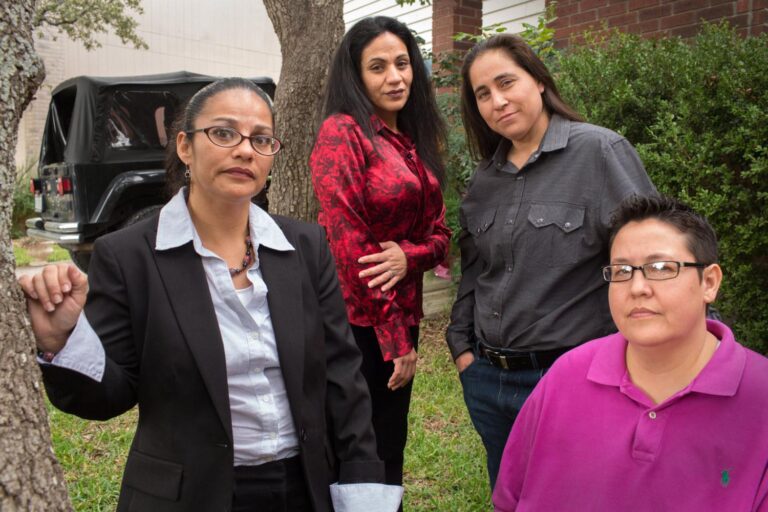Unveiling the San Antonio Four: A Case Study in Homophobia and Judicial Missteps
Voices of the San Antonio Four: Challenging Convictions Fueled by Prejudice
The San Antonio Four—a group of Latina women convicted in the mid-1990s of child sexual abuse linked to alleged satanic rituals—have come forward to reveal the underlying homophobic bias that tainted their trials. Despite maintaining their innocence for decades, their case was overshadowed by a community’s fear and intolerance toward their sexual orientation. One member reflected, “Our prosecution was never about evidence; it was about punishing us for being lesbians in a community rife with prejudice.” Their experience highlights the perilous consequences when societal bigotry infiltrates the justice system.
Legal experts and LGBTQ+ advocates now recognize this case as part of a broader pattern where moral panic disproportionately targets queer individuals under the pretext of child protection. The San Antonio Four emphasize that such injustices are not confined to history but remain relevant today, urging systemic changes including:
- Reevaluating wrongful convictions linked to bias across the country
- Introducing comprehensive anti-discrimination training for law enforcement and judiciary members
- Increasing public education on how homophobia can distort legal processes
| Year of Conviction | Case Context | Identified Bias |
|---|---|---|
| 1994 | Allegations of satanic ritual abuse | Entrenched homophobic attitudes |
| 2009 (Exoneration) | DNA evidence disproved accusations | Growing societal acceptance of LGBTQ+ rights |
The Legacy of Satanic Panic: How Fear Distorted Justice
The widespread Satanic Panic that gripped the United States during the 1980s and early 1990s left a lasting scar on the legal landscape. Fueled by sensational media coverage and public hysteria, numerous innocent individuals were convicted based on dubious claims of occult abuse. The San Antonio Four’s ordeal is a poignant example of how this climate of fear, combined with societal prejudices, led to grave miscarriages of justice. Their convictions rested heavily on coerced testimonies and unreliable evidence, reflecting a justice system swayed more by panic than by facts.
Several critical elements exacerbated these wrongful convictions:
- Homophobic Bias: The women’s sexual orientation was weaponized to portray them as deviant and dangerous, undermining their credibility.
- Questionable Investigative Practices: Authorities employed suggestive and leading questioning techniques that implanted false memories in child witnesses.
- Media Amplification: Sensationalist news coverage intensified public fear, pressuring officials to secure convictions regardless of evidence quality.
This toxic combination transformed courtrooms into battlegrounds of hysteria rather than forums for justice. The eventual overturning of the San Antonio Four’s convictions underscores the urgent need to scrutinize how societal fears and biases can warp legal outcomes.
| Factor | Effect on Case |
|---|---|
| Public Fear | Amplified false accusations |
| Judicial Prejudice | Ignored credible defense evidence |
| Interrogation Techniques | Produced unreliable testimonies |
| Media Influence | Prejudiced public opinion against defendants |
Legal Advocates Push for Reforms to Combat Bias in Abuse Investigations
Following the revelations from the San Antonio Four case, legal reformers and activists are calling for sweeping changes to prevent bias—especially homophobia—from skewing abuse allegations. They argue that remnants of the satanic ritual abuse hysteria still linger, clouding judicial impartiality and leading to wrongful convictions. To safeguard fairness, these advocates propose a legal framework that actively counters prejudicial narratives and ensures equitable treatment for all defendants, regardless of sexual orientation or identity.
Key reform initiatives include:
- Mandatory diversity, equity, and inclusion training for judges, prosecutors, and law enforcement
- Procedural safeguards to critically evaluate claims influenced by societal stereotypes or panic
- Enhanced appellate review mechanisms to detect and overturn biased verdicts
- Establishment of independent oversight bodies to impartially assess abuse allegations
| Current Issue | Suggested Reform | Anticipated Benefit |
|---|---|---|
| Acceptance of biased testimony | Bias-awareness training for jurors and judges | Decrease in wrongful convictions |
| Insufficient interrogation oversight | Independent observers during questioning | Improved accuracy and fairness |
| Outmoded evidentiary standards | Modernized legal criteria | Reduced influence of stereotypes |
Enhancing Professional Training to Mitigate Bias in Child Welfare Cases
In response to the San Antonio Four’s wrongful convictions, experts stress the importance of comprehensive training programs for child protection professionals. These initiatives should not only focus on identifying clear signs of abuse but also on recognizing and counteracting implicit biases that can distort investigations. Without such education, marginalized groups remain vulnerable to unjust accusations.
Recommended training components include:
- Implicit Bias Workshops: Equipping caseworkers and law enforcement with tools to detect and address subconscious prejudices, including homophobia.
- Evidence-Based Investigation Techniques: Encouraging reliance on scientifically validated methods rather than anecdotal or culturally biased testimonies.
- Interdisciplinary Collaboration: Promoting teamwork among child welfare agents, psychologists, social scientists, and legal professionals to ensure balanced assessments.
| Training Element | Goal | Expected Result |
|---|---|---|
| Bias Recognition | Uncover hidden prejudices | More objective investigations |
| Evidence Assessment | Prioritize factual data over assumptions | Fewer wrongful accusations |
| Collaborative Practices | Integrate diverse expert insights | Comprehensive child welfare evaluations |
Final Reflections: Lessons from the San Antonio Four for Justice and Equality
The saga of the San Antonio Four serves as a powerful illustration of how entrenched societal prejudices—particularly homophobia—can infiltrate and undermine the justice system. As these women continue their fight for full exoneration, their story compels us to confront the ways moral panic and bias can distort legal outcomes. Moving forward, it is imperative to ensure that convictions rest solely on credible evidence, protecting the rights and dignity of all individuals, irrespective of their sexual orientation or identity.



